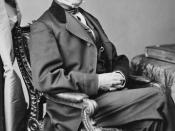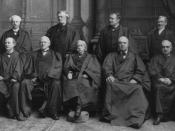Napoleon Bonaparte once said,"History is the version of past events that people have decided to agree upon." This straightforward quote can be associated to the Supreme Court and their decisions affecting our US History today. Supreme Court decisions become the "law of the land" and, as such have far-reaching consequences for American society. The Court tells us, through their interpretation of the Constitution the meaning of our protections and restrictions. Supreme Court cases have a lot of credence and many Supreme Court cases have had lasting effects on our society today. Two landmark supreme court cases which have an exceptional impact in the present day are Brown v. Board of Education of Topeka and Tinker v. Des Moines School District. These two cases had a great impact on US History and affected our lives forever.
Perhaps no other case decided by the Court in the 20th century has had so profound an effect on the social fabric of America as Brown v.
Board of Education of Topeka. The integration of labor unions in the 1930s under the eye of the Fair Employment Practices Commission and the desegregation of the armed forces in 1948 marked major steps toward racial integration. However, the legal framework on which segregation rested was itself being dismantled, challenged repeatedly by the National Association for the Advancement of Colored People (NAACP).The doctrine of "separate but equal" was being to crack. However, the 1950's brought a new wave of challenges to official segregation by the NAACP. Linda Brown, an eight-year-old African-American girl had been denied permission to attend an elementary school only five blocks from her home in Topeka, Kansas. Separate elementary schools for whites and nonwhites were maintained by the Board of Education in Topeka. Linda Brown's parents filed a lawsuit to force the schools...


